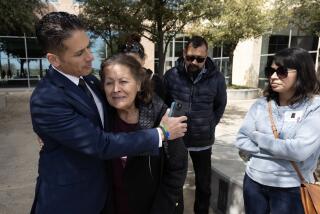U.S. Open Tennis : This Time, the ‘Choke’ Isn’t on Lendl as Noah Falls in Straight Sets
- Share via
NEW YORK — And now for something completely different, tennis fans, we take you to the men’s quarterfinals of the U.S. Open Thursday.
There, on the Stadium Court, Ivan Lendl played an important match, one of the contestants allowed the pressure of the moment to get the best of him, a mismatch was the result. . . . and the guilty party wasn’t Lendl.
Talk about upsets.
Lendl, who has never won at Flushing Meadow, who has lost the last three U.S. Open finals, who has been called a “choker” more times than the Boston Strangler, wasn’t the one with the sweaty palms and the woefully deficient effort this time.
Lendl was instead the benefactor of Yannick Noah’s disappearing act. Noah, well on his way toward displacing Lendl as the game’s greatest unfulfilled potential, barely put up a scuffle in a 6-2, 6-2, 6-4 defeat.
Thus, Lendl will have to wait another round for his first real challenge of the tournament. It will come in the person of Jimmy Connors, who advanced to the U.S. Open semifinals for a record 12th straight year with a 6-2, 6-2, 6-4 decision over Heinz Gunthardt of Switzerland.
That the challenge didn’t come against France’s Noah was a surprise. And a disappointment.
Jaime Yzaga, the unknown 17-year-old junior from Peru, gave Lendl a better workout than Noah, a player who has won the French Open and owns perhaps the most impressive physical gifts in tennis.
Yzaga, at least, won a set from Lendl in his fourth-round loss.
Noah won a total of eight games.
Noah never broke Lendl’s serve. Never really came close.
He had exactly one break point. That came in the sixth game of the third set, with the outcome already fairly well decided. Noah squandered that opportunity by netting a backhand volley and never got another.
He didn’t fare much better in his own service games. Noah’s first-serve percentage was just 51%. He double-faulted six times.
“I felt that I wasn’t doing anything really good,” Noah said. “I wasn’t play well. I couldn’t compete the way I wanted because I was making too many unforced errors.”
Noah also said: “I was slow. I didn’t give it my all. I lost and I’m not really even tired. . . . I don’t feel like somebody who really had a hard match.”
Those aren’t the sort of comments one expects following a quarterfinal match at a Grand Slam tournament.
But Noah was right. He had no reason to be fatigued. He went about his business as if he were playing an exhibition--money guaranteed--instead of contending for a berth in the U.S. Open semifinals.
Noah did know that was at stake, didn’t he?
“I was tight,” he said, “because I thought I had a chance coming into this match. You know the last time we played, I won the match so I felt I had a good chance. I was feeling good and expected a lot from this match.
“I thought I could win it, so I started to think about playing the semis and even the finals. Right now, it’s a little bit disappointing because I didn’t give all that I could give--you know, I didn’t even compete much.”
Even Lendl noticed something was amiss on the opposite side of the net.
“He seemed to pace himself from the very first point of the match,” Lendl said. The telltale signs?
“If the ball is too far away at 30-0, just let it go,” Lendl said. “I could just tell he was moving slower.”
Lendl said he wasn’t criticizing Noah--only questioning his judgment.
“I would like to make this clear. I didn’t mean he didn’t try,” Lendl said. “I meant that he was pacing himself. If you go all out and he’s pacing himself, you hope that your judgment was right and not his.
“If your judgment was wrong, you’re going to give everything out, and the match will still be going and you will have nothing left and he will kick in. If your judgment is right, then you will finish him off before you lose your energy.”
Playing in the mid-day heat and concerned about energy conservation, Noah decided to save it for later. One problem: Later never came.
Lendl finished him off in less than two hours. Noah was all rested up . . . with no place to go.
It gets tougher for Lendl from here on out. Next up is Connors, an arch-enemy from way back, who won U.S. Open titles in 1982 and 1983 when Lendl pulled Choke I and Choke II.
Connors did to Gunthardt what Lendl did to Noah. In fact, he won via the same score. The recent ledger, however, favors Lendl. Connors has lost his last six encounters with the Czech.
But at 33, Connors knows he may not pass this way again. Saturday’s semifinal will be an opportunity he cannot afford to waste.
“Every time is a new time,” Connors said. “If I’m playing good tennis, it doesn’t matter.
“My time will come, but I get a sense that you guys are trying to push me out of the game a lot sooner than I want. You’re going to be sorry when I’m gone.”
Well, not everybody, Jimbo. There’s always Lendl.
Because of Connors, Lendl owns a reputation he is still trying to live down. Even in victory, reference was made to Lendl’s past defeats.
Someone asked him about his five losses in tournament finals this year.
“I wouldn’t call it a string of losses. I have won five finals also,” he said. “I don’t think it’s such a record to worry about it.”
What about the other record Lendl remains in contention for--four consecutive losses in the U.S. Open finals?
“I see, well, I’m going to go for that one,” Lendl joked.
On this day, it was easy for him to laugh--when Lendl wasn’t the one doing the choking.
More to Read
Go beyond the scoreboard
Get the latest on L.A.'s teams in the daily Sports Report newsletter.
You may occasionally receive promotional content from the Los Angeles Times.










